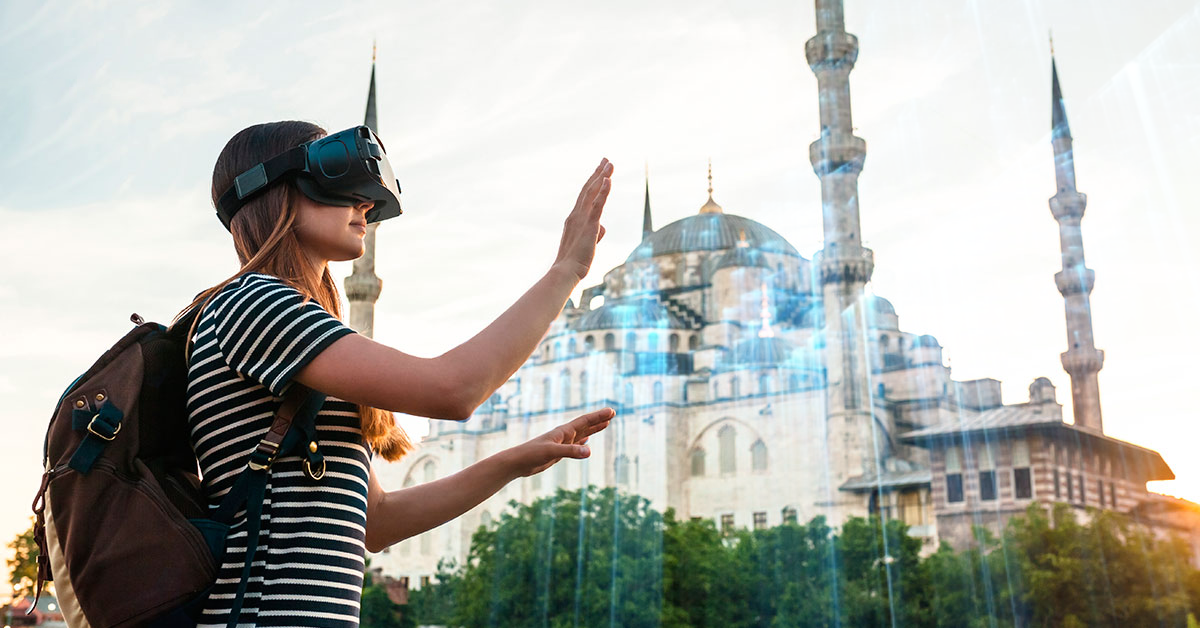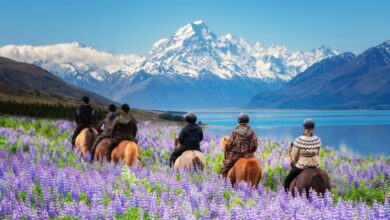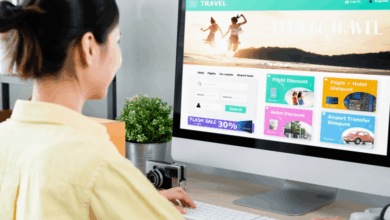Digital Travel Revolution Transforms Tourism

The global travel industry is experiencing a technological renaissance, with digital tools fundamentally reshaping every aspect of how we plan, book, experience, and remember our journeys. This digital transformation extends far beyond simple online booking to encompass artificial intelligence, augmented reality, blockchain, and sophisticated data analytics that collectively create more personalized, efficient, and immersive travel experiences. The explosion of digital travel tools represents one of the most significant shifts in tourism since the advent of commercial air travel, democratizing access to sophisticated travel planning while enabling unprecedented levels of customization and convenience. This comprehensive analysis explores how digital innovation is revolutionizing travel and examines the implications for travelers, businesses, and destinations in this new technological landscape.
A. Intelligent Planning and Booking Platforms
The initial stages of travel have been transformed by AI-powered platforms that simplify complex decisions while delivering highly personalized recommendations.
A. AI-Powered Travel Assistants: Sophisticated artificial intelligence now handles the heavy lifting of travel planning.
-
Natural Language Processing Integration: Platforms like Kayak and Google Travel now understand complex, multi-parameter queries such as “beach vacation within 4 hours flight with luxury spas and vegan dining options.” These systems analyze thousands of variables to deliver tailored recommendations that match nuanced preferences rather than just basic filters.
-
Predictive Pricing Algorithms: Advanced machine learning systems now forecast price fluctuations with astonishing accuracy. Tools like Hopper and Google Flights predict optimal booking times with 95% accuracy, saving travelers an average of 15-40% on airfare and accommodations. These systems analyze historical data, seasonal patterns, and even external factors like weather events and conferences to identify pricing trends.
-
Automated Itinerary Optimization: AI platforms like Utrip and Inspirock now create optimized daily schedules that factor in travel time between attractions, opening hours, and even crowd patterns. These systems can automatically adjust itineraries based on real-time factors like weather changes or unexpected closures, ensuring travelers maximize their valuable vacation time.
B. Social Travel Planning Revolution: The wisdom of crowds has become increasingly sophisticated through specialized platforms.
-
Visual Inspiration Platforms: Pinterest and Instagram have evolved into serious travel planning tools, with visual search capabilities that allow users to identify destinations from images and find similar locations. These platforms drive 35% of travel inspiration according to recent industry surveys, with users increasingly moving directly from visual discovery to booking.
-
Specialized Review Ecosystems: Beyond generic review sites, platforms like The Points Guy for luxury travel, Family Vacation Critic for family trips, and Nomadic Matt for budget travel provide specialized insights from trusted experts and communities. These niche platforms often deliver more relevant information than general review sites.
-
Video-First Planning Resources: YouTube and TikTok have become essential travel research tools, with creators offering immersive destination previews and practical tips. Travel vloggers now function as virtual tour guides, with dedicated followers basing entire itineraries on their recommendations.
C. Blockchain and Payment Innovations: Financial transactions and documentation are being streamlined through distributed ledger technology.
-
Secure Digital Identity Management: Companies like ShoCard and IBM’s Digital Health Pass are creating blockchain-based identity systems that streamline airport security and hotel check-ins while protecting personal information. These systems reduce processing time by up to 70% while enhancing security.
-
Smart Contract Automation: Travel insurance, loyalty programs, and rebooking processes are increasingly handled through blockchain smart contracts that automatically execute when conditions are met. This eliminates paperwork and speeds up claim processing from days to minutes.
-
Cryptocurrency Payment Integration: Major travel companies including Expedia, Travala, and CheapAir now accept cryptocurrency payments, while specialized platforms enable seamless currency conversion during international transactions, reducing foreign exchange fees by 2-5%.
B. Immersive Pre-Travel Experience Tools
Potential travelers can now explore destinations virtually before committing, reducing uncertainty and enhancing anticipation.
A. Virtual Reality Destination Previews: VR technology allows thorough exploration before departure.
-
Immersive Hotel and Resort Tours: Companies like Matterport and YouVisit create photorealistic 3D virtual tours that allow travelers to explore accommodations room-by-room, examine views from specific balconies, and evaluate amenities before booking. Hotels using these technologies report 25-40% reduction in cancellation rates.
-
Cultural and Historical Previews: Museums, historical sites, and cultural institutions now offer VR experiences that provide context and background before visits. The British Museum and Smithsonian Institution lead in this space, offering virtual exhibitions that enhance actual visits by providing foundational knowledge.
-
Adventure Activity Simulations: Potential travelers can now test activities like scuba diving, skiing, or hiking through VR simulations that assess both interest and capability. These tools help travelers choose appropriate experiences and prepare adequately for physical challenges.
B. Augmented Reality Planning Tools: AR applications overlay digital information onto the real world to assist travel planning.
-
Language Translation Integration: Apps like Google Translate and Microsoft Translator use smartphone cameras to instantly translate menus, signs, and documents, dramatically reducing language barriers. These tools now work offline for dozens of languages, making them practical anywhere.
-
Navigation and Orientation Previews: Tools like Google Maps AR and Mapillary provide street-level views and navigation overlays that help travelers familiarize themselves with destinations before arrival. This reduces initial disorientation and helps optimize first-day itineraries.
-
Cultural Context Enhancement: AR applications like HistoryView VR and Augmently overlay historical images, reconstructions, and information onto real-world locations, bringing guidebook information to life in context.
C. Social Travel Validation Platforms: Modern travelers increasingly rely on social proof from trusted sources.
-
Real-Time Crowd Monitoring: Apps like Google Maps and specialized tools like Crowdless provide real-time information about how busy attractions, restaurants, and transportation hubs are, enabling travelers to optimize timing and avoid frustration.
-
Travel Influencer Verification: Platforms like Tripadvisor and Instagram are developing verification systems to identify authentic reviews and recommendations while filtering out paid promotions without disclosure. This helps travelers distinguish between genuine advice and marketing content.
-
Personal Network Recommendations: Travel-specific social networks like Travello and Tourlina connect travelers with friends and friends-of-friends who have visited destinations, providing trusted, personalized advice beyond generic online reviews.
C. In-Destination Experience Enhancement
Once travelers reach their destinations, digital tools continue to enhance experiences through real-time assistance and personalization.
A. Mobile-Centric Travel Management: Smartphones have become comprehensive travel companions.
-
Digital Wallet Integration: Mobile wallets now consolidate boarding passes, hotel keys, attraction tickets, and transportation passes in secure, accessible formats. Airlines like Delta and United report that 75% of passengers now use digital boarding passes, reducing check-in time by 50%.
-
Unified Travel Assistant Apps: Platforms like TripIt and Google Trips automatically organize reservations, documents, and itineraries in chronological order while providing real-time alerts about delays, gate changes, and other important updates. These tools reduce travel anxiety by centralizing critical information.
-
Expense Tracking Automation: Apps like Expensify and Trail Wallet automatically categorize and track travel expenses using OCR technology that reads receipts, simplifying reimbursement and budget management. Business travelers using these tools save an average of 3-5 hours weekly on expense reporting.
B. Real-Time Local Intelligence: Location-aware services provide contextually relevant information.
-
Personalized Recommendation Engines: Platforms like Google Maps and Yelp now offer recommendations based on individual preferences, current location, time of day, and even weather conditions. These systems learn from user behavior to become increasingly accurate over time.
-
Event and Activity Discovery: Tools like Eventbrite, Meetup, and local discovery apps surface interesting happenings based on personal interests and availability. These services have dramatically increased spontaneous local experiences during travel.
-
Public Transportation Integration: Comprehensive apps like Citymapper and Moovit simplify navigation of unfamiliar transit systems with real-time arrival information, service disruption alerts, and optimized routing that combines multiple transportation modes.
C. Communication and Connectivity Solutions: Staying connected while traveling has become seamless and affordable.
-
Global SIM and eSIM Services: Companies like Airalo and KnowRoaming offer affordable data packages that work across multiple countries, eliminating the need for physical SIM cards and dramatically reducing roaming costs. eSIM technology enables instant activation without visiting stores.
-
Translation and Communication Tools: Real-time translation earbuds like Google Pixel Buds and pocket translators like Pocketalk break down language barriers during conversations, not just for written text. These tools enable meaningful interactions regardless of language differences.
-
Emergency and Safety Applications: Services like GeoSure and bSafe provide location-specific safety information, emergency assistance coordination, and real-time alerts about developing situations, providing peace of mind particularly for solo travelers.
D. Post-Travel Engagement and Memory Preservation
The travel experience now extends beyond returning home through digital tools that enhance memories and facilitate sharing.
A. Automated Memory Creation: Technology now captures and organizes travel memories with minimal effort.
-
Intelligent Photo Management: Google Photos and Apple Photos automatically create albums, animations, and collages from travel images while using facial recognition to organize pictures by people and places. These systems can even resurrect forgotten moments through “rediscover this day” features.
-
Travel Journal Automation: Apps like Polarsteps and Journi automatically track routes and compile timelines using phone location data and photos, creating detailed travel journals without manual effort. These platforms have made comprehensive travel documentation accessible to everyone.
-
Social Sharing Integration: Seamless sharing to multiple platforms simultaneously has become standard, with tools like IFTTT and Buffer enabling automated posting to Instagram, Facebook, and travel-specific networks with customized messaging for each audience.
B. Travel Impact Assessment: Modern travelers increasingly want to understand and offset their travel footprint.
-
Carbon Emission Tracking: Apps like MyClimate and Sustainable Travel International calculate the environmental impact of trips and facilitate carbon offset purchases. Some airlines now integrate these calculations directly into booking platforms.
-
Economic Impact Analysis: New tools help travelers understand how their spending distributes through local economies, highlighting businesses that maximize local benefit. This information influences future travel decisions and spending patterns.
-
Cultural Exchange Evaluation: Reflective tools prompt travelers to consider their cultural interactions and impacts, fostering more mindful and respectful travel practices through structured reflection exercises.
C. Loyalty and Relationship Management: Digital tools have transformed how travelers interact with brands after trips.
-
Integrated Loyalty Programs: Apps now automatically track and optimize loyalty program benefits across airlines, hotels, and credit cards. Platforms like AwardWallet and Point.me help travelers maximize value from accumulated points and miles.
-
Automated Feedback Systems: Post-trip surveys and review requests are increasingly automated and personalized based on specific experiences. This has increased response rates while providing businesses with more actionable feedback.
-
Re-engagement and Future Planning: Travel companies use AI to analyze past trips and suggest future destinations that match evolving preferences, maintaining engagement between travels and inspiring repeat bookings.
E. Emerging Technologies and Future Directions
The digital travel revolution continues to accelerate, with several emerging technologies poised to further transform the industry.
A. Artificial Intelligence Evolution: AI capabilities are advancing beyond recommendation engines to proactive travel management.
-
Anticipatory Travel Planning: Future AI systems will predict travel needs before users recognize them, suggesting trips based on work schedules, personal interests, and even stress levels detected through wearable devices.
-
Conversational Commerce Integration: Voice assistants will handle increasingly complex travel arrangements through natural conversations, understanding nuance and context to deliver highly personalized options.
-
Emotional Intelligence Applications: AI will begin to recognize and respond to traveler emotions, adjusting recommendations and interventions based on detected stress, excitement, or frustration.
B. Biometric and Frictionless Travel: Physical travel processes are becoming increasingly seamless.
-
Comprehensive Biometric Ecosystems: Airports and hotels are developing integrated biometric systems that use facial recognition for everything from check-in to boarding to room access, eliminating the need for documents and keys.
-
Predictive Security Screening: Advanced algorithms will pre-clear low-risk travelers for expedited security while focusing resources on higher-risk individuals, reducing wait times while maintaining safety.
-
Behavioral Analysis for Personalization: Systems will analyze traveler behavior patterns to anticipate needs and preferences, creating increasingly intuitive and personalized experiences without explicit instructions.
C. Sustainable Travel Technology: Technology is enabling more environmentally responsible travel.
-
Carbon Footprint Visualization: Advanced tools will provide real-time visibility into environmental impact, suggesting alternatives that reduce footprint without compromising experience quality.
-
Circular Economy Platforms: New marketplaces will facilitate sharing and reuse of travel gear and resources, reducing waste while creating economic opportunities.
-
Regenerative Tourism Measurement: Sophisticated metrics will help travelers choose options that actively improve destinations rather than merely minimizing harm, supporting tourism that leaves places better than found.
Conclusion: The Digitally Transformed Travel Experience
The explosion of digital travel tools represents a fundamental shift in how we experience the world, making travel more accessible, personalized, and meaningful than ever before. These technologies have democratized sophisticated travel planning while enabling experiences tailored to individual preferences, values, and travel styles. The most successful travel businesses will be those that embrace these digital tools not as add-ons but as integral components of the travel experience, seamlessly blending technology with human hospitality to create exceptional journeys. As these technologies continue to evolve, they promise to further reduce travel friction while enhancing connection, understanding, and joy. The future of travel is digital, personalized, and increasingly sustainable—and the revolution has only just begun.
Tags: travel technology, digital travel tools, travel apps, tourism innovation, travel planning, mobile travel, travel tech, digital transformation, travel industry, travel software, smart tourism, travel innovation






